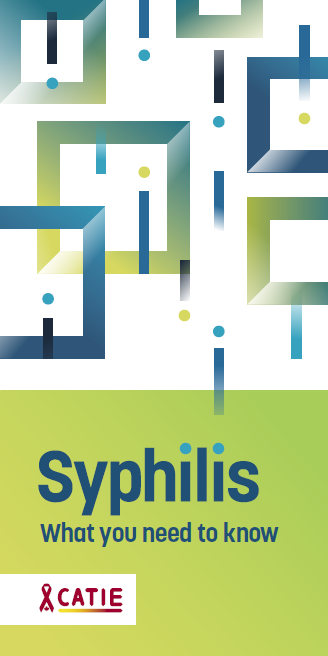What is syphilis?
Syphilis is a bacterial sexually transmitted and blood-borne infection (STBBI). Not everyone with syphilis notices symptoms. If you do notice symptoms, the first is often a small painless sore on or in your genitals, anus, mouth or throat.
Syphilis can lead to serious health problems if left untreated.
The only way to know if you have syphilis is to take a syphilis test.
Syphilis can be cured, and there are ways to lower your chances of getting or passing syphilis.
How does someone get syphilis?
Syphilis is typically passed through direct contact with a syphilis sore.
This usually happens during sex, including:
- vaginal or frontal sex
- anal sex
- oral sex (including oral-anal)
Syphilis is easily passed from a pregnant person to a baby during pregnancy or delivery.
Syphilis may also be passed by sharing sex toys, deep kissing or sharing equipment used to inject drugs. These routes are less common.
Even if a person with syphilis has no symptoms, they can still pass syphilis.
If you think you have been exposed to syphilis, or you're unsure, talk to a healthcare provider about getting tested.
Consider testing regularly if you engage in activities that can pass syphilis.
How can I protect myself and others?
To lower the chance of getting or passing syphilis, you can:
- use a condom correctly every time you have sex
- use a condom or oral dam during oral sex
- clean and put a new condom on sex toys between every use
- ask a healthcare provider if taking the antibiotic doxycycline (doxy) to prevent syphilis is an option for you
- use your own new injection equipment every single time, if you inject drugs
There is no vaccine to prevent syphilis.
How can syphilis affect my health?
At first, many people who get syphilis have no symptoms or they do not notice the symptoms. However, an untreated syphilis infection stays in the body and can progress.
Syphilis often progresses through stages:
Primary syphilis: A small painless sore may appear on or in the vagina, penis, anus, mouth or throat, usually within three weeks after infection. This sore can be hard to notice and heals without treatment. Nearby lymph nodes may also become swollen.
Secondary syphilis: A non-itchy rash may appear on the torso, hands or feet. This usually develops between four and 12 weeks after infection and heals without treatment. Other symptoms may also occur, such as new sores, fever, headache, muscle ache, lack of appetite, fatigue or hair loss.
Latent syphilis: Early syphilis symptoms can disappear at any time, even without treatment. However, untreated syphilis can stay in the body for years or decades, without causing any noticeable symptoms.
Tertiary syphilis: This stage is the most serious and can start after years or decades with no symptoms. Syphilis at this stage can damage any organ system, which can lead to permanent disabilities and serious illnesses and even be life-threatening. Most people with syphilis do not progress to this stage, even if they haven’t been treated.
Neurosyphilis: Untreated syphilis can affect the brain or nervous system at any stage. This can cause serious problems such as loss of hearing or vision, difficulty with memory and thinking, or changes in personality.
Can syphilis affect my baby?
Syphilis can be passed easily to a baby during pregnancy or childbirth. This can cause miscarriage, premature birth, stillbirth or the death of a newborn. Babies with syphilis can go on to have serious problems with their health and development. Syphilis in babies can be prevented by early and effective treatment of pregnant people with syphilis.
How do I know if I have syphilis?
The only way to know for sure is to get tested. A healthcare provider can do the test. It is usually a blood test, but sometimes a swab is used to get fluids from a sore. Anyone who thinks they may have been exposed to syphilis should get tested. If you think you might be at ongoing risk for syphilis, it is a good idea to get tested regularly.
All pregnant people should be tested for syphilis. Pregnant people who are at ongoing risk for syphilis should be tested regularly.
When you take a syphilis test, it is a good idea to get tested at the same time for other STBBIs, including HIV, gonorrhea and chlamydia. Other STBBIs can be passed in the same ways as syphilis. Talk to a healthcare provider about how often you should get tested for syphilis and other STBBIs.
What if I have syphilis?
For most people, syphilis can be cured with a single course of treatment. This involves receiving injections during a single appointment or taking pills for about two weeks.
Ask a healthcare provider how long you should wait after completing treatment before you have sex again.
Can I get syphilis again?
Yes. Having syphilis before does not protect you from getting it again. This is why it is important to keep getting tested regularly and keep using prevention methods, if you engage in activities that can pass syphilis.

